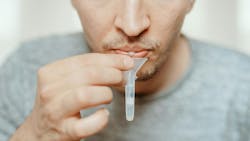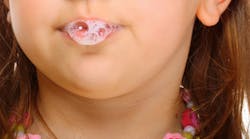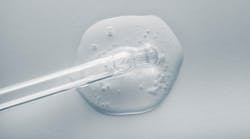Saliva testing: Nothing to spit at
Spit is a new weapon in oral and systemic disease detection. Spit can be analyzed to show what the microbiome is doing and if there’s elevated good or bad bacteria. For example, aggregaitbacter actinomycetemcomitans (Aa) is found in periodontitis cases but can infect heart valves, brain, and lungs.1 Porphyromonas gingivalis (Pg) is the leading cause of periodontal disease in humans.2
The mouth microbiome contains 700 different species of bacteria.3 Some of these promote health and others promote disease. These bacteria do not all stay in the mouth; many that originate in the mouth are associated with diseases and conditions in other parts of the body. This can happen by swallowing bacteria that ends up in the gut.
Bacteria are also transferred in the bloodstream. When we chew, brush, or floss, the bacteria can get pushed into the sulcus of gum tissue. With gum disease, the seal that is the epithelium and endothelium is broken down and the bacteria that would otherwise stay in the mouth enters the bloodstream.
The process for salivary testing
I’ve found three different ways to test spit. The first is the drool method, where the patient lets saliva flow from their mouth into a tube that is then sealed and sent off for evaluation. The second method is to swish with a rinse. The patient swishes and gargles for at least 30 seconds and spits the rinse into a tube via a funnel. An additive is placed into the tube, which is sent off to the company that provided the kit.
The third system is a sponge placed in the patient's mouth and chewed on to help extract saliva. The saliva is mixed chairside in vials and dropped into a testing sheet. The results are given via an app in eight minutes.
What to consider before testing
One thing to keep in mind when thinking about salivary testing is the cost. Depending on the company, tests can range from $65 to $235. You’ll need a protocol that shows patients how beneficial the service is, as well as something that can help absorb the cost.
The benefit of salivary testing is its ability to detect oral diseases early so you can take proactive measures to combat disease effectively. Regular salivary testing can help identify potential issues before they become serious, which allows for more targeted and successful treatment options.
What to do after the test
Based on the results of salivary testing, several proactive measures can be taken to improve oral health. These can include scaling and root planing, antibiotics or probiotics, different home-care techniques, and changes to the diet. A health-care provider can help someone determine which measures are most appropriate for their needs. The salivary test can measure caries risk and help practitioners recommend products to help combat dental disease. It can also screen for diabetes.
How do you know what to tell a patient about their testing? The great thing is that the companies that do salivary testing send a report to you and the patient with recommended protocols. Scaling and root planing alone cannot eliminate all bacteria. Some bad bacteria become superbugs and need additional help to eliminate them.
References
1. Mesturino MA, Bitetti C, Clemente A, et al. A. Aggregatibacter actinomycetemcomitans infection in a 15-year-old boy with pulmonary empyema: a case report and review of literature. Ital J Pediatr. 2023;49(1):42. doi:10.1186/s13052-023-01429-4
2. Mei F, Xie M, Huang X, Long Y, Lu X, Wang X, Chen L. Porphyromonas gingivalis and its systemic impact: current status. Pathogens. 2020;9(11):944. doi:10.3390/pathogens9110944
3. Deo PN, Deshmukh R. Oral microbiome: unveiling the fundamentals. J Oral Maxillofac Pathol. 2019;23(1):122-128. doi:10.4103/jomfp.JOMFP_304_18
About the Author
Chrissy Harlow, BSDH, RDH
Chrissy Harlow, BSDH, RDH, is an experienced dental hygienist committed to exceptional patient-centric care in a comfortable and supportive environment. She is an experienced problem-solver who can troubleshoot issues and develop solutions. Chrissy thrives in collaborative environments. She’s dedicated to supporting the entire dental office and creating positive experiences for patients and staff.


